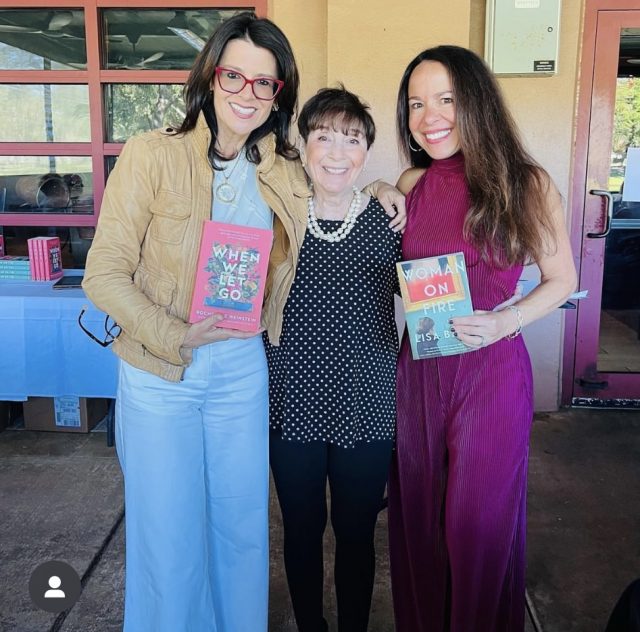When Your Story Hits Too Close to Home
In 2002, this happened. My first husband, to whom I was married nine years, disappeared. He left me with two little girls, then five and three, with just 67 cents in my bank account. We have not seen nor heard from him since then. Oh, the story …. the twists and turns … along this nightmare, from despair to survival. Once our lives had finally quieted down, I knew I wanted to write about it. But this tale was not just my life, but my girls’ lives … could I write it? Should I? What would be the consequences? So I waited until my daughters were old enough to really understand. “Can I write our story?” I asked them both. “Yes,” they replied. So I spent the next year and a half writing a memoir. Once I finished it, my eldest who was entering high school at the time, said, “I changed my mind, Mommy. Please don’t write that book – it’s so embarrassing.” And so it goes … the memoir was shelved, but not the story, not the impact of what it did to me, did to us. The written story was dead, but the emotions were still very much alive and I used them within other works.
Flash forward to 2017… a close friend’s husband betrayed her in the worst possible way. “Can I write this story?” I asked her, intending to fictionalize it but keep the soul, the emotional intensity. “Yes,” she said generously, but then I saw the fear in her eyes. “I will show it to you,” I promised. “I will work with you. I will protect you.”
And there it is … Protection. So many of us are not just storytellers, but raconteurs of real stories, real people, real incidents that impact us. Having worked as a journalist for 25 years … I always keep this in the back of my mind whether it’s non-fiction or fiction based on something real: Every word I write, every story I tell — the who, what, when, where, why, and how – belongs to someone else. Here are a few Rules of the Road to keep in mind while basing your story on someone else’s personal experience:
Friendships and close relationships should not be sacrificed in the name of Art. My advice is to change the recognizable details of your subject first thing. Age, physical description, and the obvious giveaways. Reshape pertinent details both in the background and plot in order to keep the real subject distant. Do keep the passion, all the feels that makes the story powerful. Most importantly, when I was working on my new novel, The Unbreakables, which was loosely based on someone’s real experience, I checked in and allowed my subject to read the first draft. Her comfortability with various details and suggestions were implemented. Once she gave me the go-ahead, I felt free. As in, guilt-free/worry-free. She trusted me to tell the truth but in a way that kept her out of it.
Do your research. Even if the story is real … it is important that you do your due diligence around it. I have written historical fiction, fiction, and suspense. In my historical thriller Fugitive Colors, the subject was stolen art during the Holocaust. I read dozens of eyewitness reports and books describing personal accounts of those whose paintings were confiscated, and those artists who were forbidden to paint under the Nazi regime. I realized that it was the emotion I needed in order to convey the real story of persecuted artists—not the names of actual individuals. In The Unbreakables, the pivotal first scene utilizes the Ashley Madison scandal which broke in July 2015 and implicated over 32 million cheaters worldwide. There too, everything about the scandal itself was real, which I used to propel a fictional character’s story.
Permission is key. If you discover a story that you have to write, but it belongs to someone else who is no longer alive—get permission. Find a family member or relative, or at least someone close to that person. Give them the respect of letting them know how much this story has impacted you and that you are planning to write a fictional tale loosely based on this experience. If they forbid you to write it – better to know this upfront than deal with heavy duty problems later.
Be prepared for possible backlash. It happens unfortunately. Have your case or “power point” ready, and remember, no surprises. Don’t write the story, get it published, and then deal with the ramifications at the family holiday party. Always remember that family grudges are held a lot longer than an Amazon ranking. However, if your story is about your child/children’s experience – as my shelved memoir was – never turn it into a memoir unless it is approved by all parties involved and that they truly understand what it means to have their experience published. Let me state upfront: I don’t have any sympathy for abusers. And I truly do understand the need to write about deep, heartfelt experiences more than anyone. But be prepared – there is a price to pay with truth-telling.
So before you put pen to paper, do your research, talk to key parties involved, change obvious details if you are turning truth into fiction – and most importantly, always be sensitive: Your words are describing someone’s life. Remember, once you put it Out There, there are no take-backs.
Do real-life events inspire your fiction? How do you distance what you put on the page from those real-life events? What steps do you take to present the innocent, and/or the guilty? Have additional advice to offer? The floor is yours.
Read more here.









